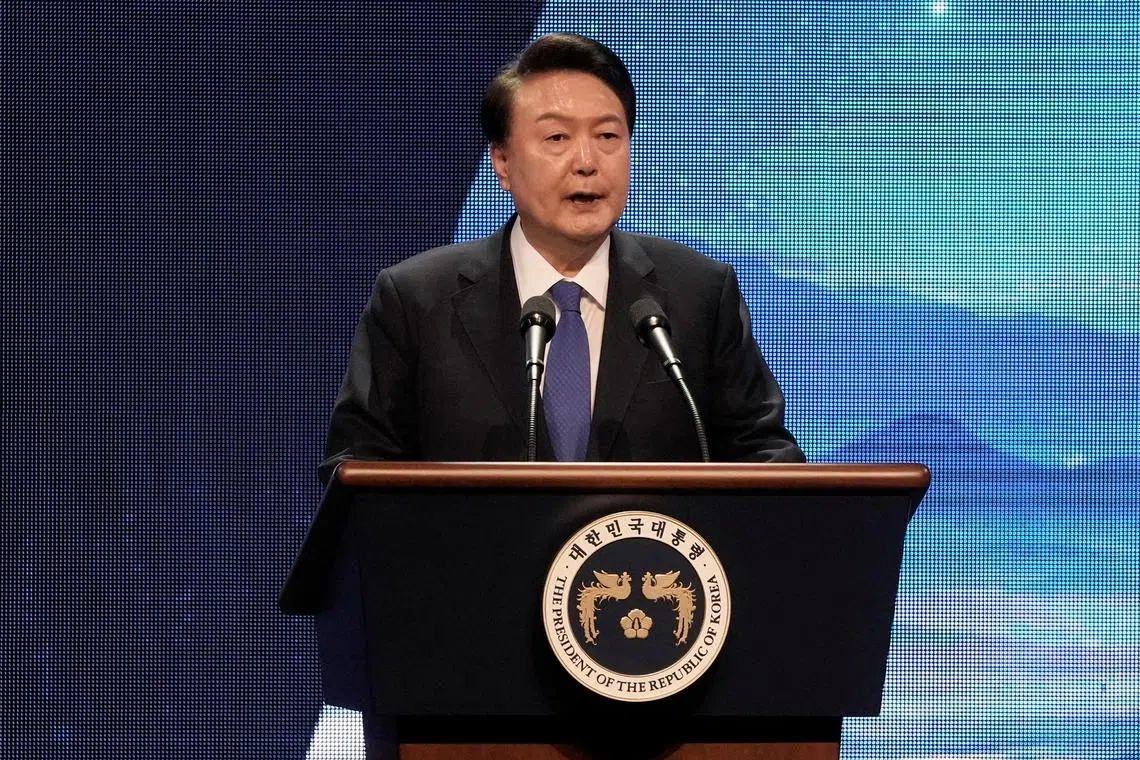South Korea’s Yoon seeks dialogue, path to unification with isolated North
Sign up now: Get insights on Asia's fast-moving developments

South Korean President Yoon Suk-yeol speaking during a ceremony to mark the 79th anniversary of independence from Japan’s 1910-45 colonial rule
PHOTO: REUTERS
SEOUL - South Korean President Yoon Suk-yeol on Aug 15 offered to establish a working-level consultative body with North Korea to discuss ways to ease tensions and resume economic cooperation, as he laid out his vision on unification of the neighbours.
In his National Liberation Day speech marking the 79th anniversary of independence from Japan’s 1910-45 colonial rule after World War II, Mr Yoon said he was ready to begin political and economic cooperation if North Korea “takes just one step” towards denuclearisation.
Mr Yoon used the speech as a chance to unveil a blueprint for unification and make a fresh outreach to Pyongyang, following his government’s recent offer to provide relief supplies for flood damage in the isolated North, which he said had been rejected.
But a unified Korea appears a distant prospect to most people on both sides of the border.
Relations between the neighbours have been at their lowest in decades as the North races to advance its nuclear and missile capabilities and takes steps to cut ties with the South, redefining it as a separate, hostile enemy state.
At the start of 2024, North Korean leader Kim Jong Un called South Korea a “primary foe” and said unification was no longer possible.
Mr Yoon said launching the “inter-Korean working group” could help relieve tensions and handle any issues ranging from economic cooperation to people-to-people exchanges, to reunions of families separated by the 1950-53 Korean War.
“Dialogue and cooperation can bring about substantive progress in inter-Korean relations,” he said.
The speech comes amid a dispute with opposition lawmakers over Mr Yoon’s appointment of what they view as a pro-Japan, revisionist former professor to oversee a national independence museum – another sign of political polarisation and divided opinions over Mr Yoon’s efforts to ramp up security ties with Tokyo.
Major independence movement groups, which had for decades co-hosted the annual National Liberation Day events with the government, held a separate ceremony for the first time in protest over the professor’s appointment, joined by opposition lawmakers.
Mr Yoon’s office has said there are “misunderstandings” about the appointment, and was seeking ways to resolve them.
Mr Yoon, in his speech, also raised the idea of a plan to launch an international conference on North Korea’s human rights and a fund to promote global awareness on the issue, support activist groups, and expand North Korean residents’ access to outside information.
“If more North Koreans come to recognise that unification through freedom is the only way to improve their lives and are convinced that a unified Republic of Korea will embrace them, they will become strong, friendly forces for a freedom-based unification.”
Professor Yang Moo-jin, president of the University of North Korean Studies in Seoul, said Pyongyang could take Seoul’s plans to promote human rights and outside information while offering aid and talks as contradictory and a threat to Mr Kim’s regime.
“Those plans look good on the surface, but from Pyongyang’s perspective, they are nothing but programmes that could contribute to overthrowing the regime,” Prof Yang said.
Mr Yoon’s 2024 speech marked a departure from his focus on Japan during past anniversaries, even as at least three Japanese Cabinet ministers visited the controversial Yasukuni shrine,
South Korea’s Foreign Ministry expressed deep disappointment over the visit, urging Tokyo to “face history and demonstrate humble reflection and genuine introspection on the past”.
The main opposition Democratic Party issued a statement denouncing Mr Yoon’s speech as a plot to consolidate his “pro-Japan, ultra-right forces” and instigate war with North Korea.
Mr Yoon’s office defended the speech, saying it showed Seoul’s confidence by seeking cooperation with Tokyo while raising thorny historical issues, as well as laying the groundwork for future unification with North Korea, even without Pyongyang’s help.
“We cannot be optimistic about when and how they (the North Koreans) will respond,” an official told reporters, while noting that a working-level consultative body would not suddenly require leaders to meet and shake hands without substantive progress. REUTERS


